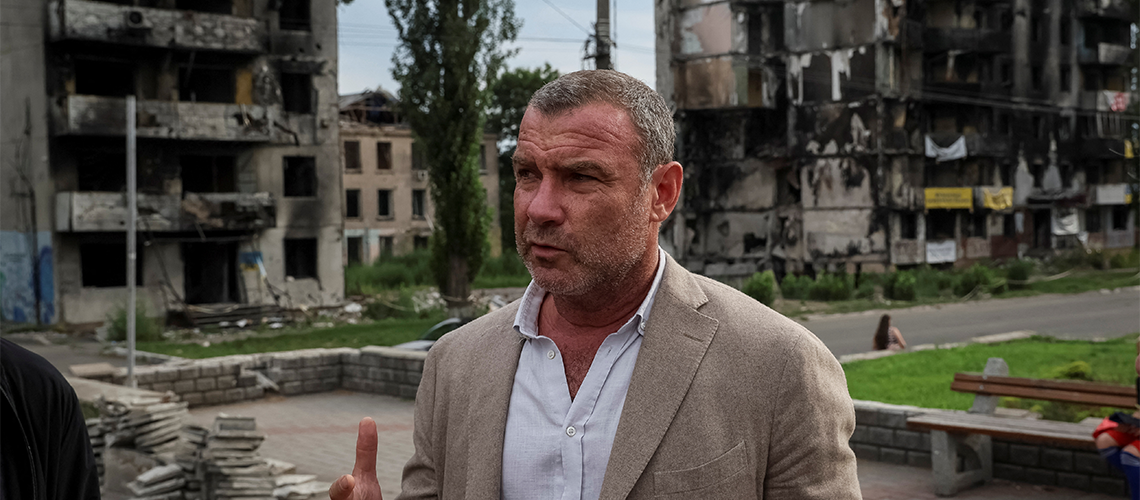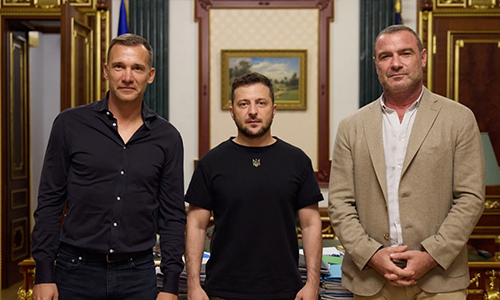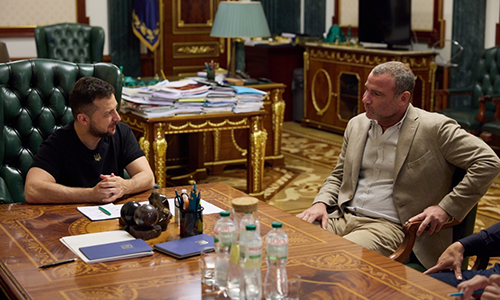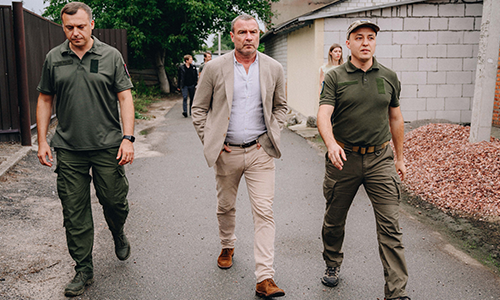An interview with Liev Schreiber
Ruth Green, IBA Multimedia JournalistTuesday 7 May 2024

The co-founder of BlueCheck Ukraine speaks to Global Insight about setting up a humanitarian aid start-up in a warzone, and why he shares the IBA’s commitment to fighting injustice and supporting Ukraine at the frontline of a war on democracy.
‘The idea of something being so difficult or daunting that we just want to ignore it is really troubling’, says Liev Schreiber, when asked why a Hollywood actor was drawn to support humanitarian efforts thousands of miles away in Ukraine just weeks into Russia’s full-scale invasion.
‘It doesn’t go away, it just gets worse and worse and worse’, says Schreiber. ‘That’s what I think about Ukraine.’ It’s this overwhelming sense of moral duty and resolve to not shy away from the horrors of war that have defined much of Schreiber’s determination to help Ukraine from the ground up.
He’s by no means the only celebrity to visit Ukraine since the war erupted. A steady stream of Hollywood stars have touched down in the country since the start of the invasion. Yet, global interest in Ukraine’s plight has waned as attention and resources have been diverted to conflicts and humanitarian crises elsewhere.
Ukraine is really at the frontline of a war on democracy
Schreiber does have roots in Ukraine of course – his maternal grandfather, Alex Milgram, a Holocaust survivor, emigrated from there. But few actors would’ve had the guts to actually fly into a warzone just weeks after the invasion in a bid to understand the challenges facing local aid groups on the ground.
For him, the shocking images of death and destruction flashing across his television screen on 24 February were a clarion call to action. Through a friend from grad school, he quickly joined forces with Jason Cone and Michael Goldfarb – who between them had more than 30 years of experience of humanitarian aid through Doctors Without Borders – and Murphy Poindexter, who had a strong background in finance and startups.
Through their collective experience, they recognised the extent to which overheads and liabilities could hamper the effectiveness of non-governmental organisations (NGOs) operating in humanitarian crises. By mid-March, mass civilian casualties and the decimation of civilian infrastructure across Ukraine heightened their concerns that aid was already struggling to get to where it was needed fast enough.
Schreiber says it was clear the country required a more agile, leaner model of humanitarian relief. ‘Local providers are best suited to providing local aid because of the access they have, because of language and because of location’, he says. ‘We all agreed that localisation was the right model in terms of speed, efficacy and location. In terms of really being able to make a difference.’
With this in mind, they founded BlueCheck Ukraine, a humanitarian start-up that identifies, vets and fast-tracks financial support directly to local NGOs and aid groups on the ground in Ukraine. In April, they flew to Poland and from there crossed the border into Ukraine and met with local NGOs to find out what they were up against.

Andriy Shevchenko (left), Volodymyr Zelenskyy (centre) and Liev Schreiber (right) in the President’s office, 2022, photo: United 24
Shortly after this, a report about localisation of aid by research group Humanitarian Outcomes confirmed their suspicions that little financial aid had been getting through to civilians in the first few months of the war. For Schreiber though, it also vindicated BlueCheck’s approach. ‘Of the something like $2.6bn that had been donated to Ukraine, just $6m had made it to the local providers – this is just a staggering number’, he says. ‘We felt pretty confident then that we were on the right track with localisation.’
From Broadway to Bucha
Although the geopolitical repercussions of the conflict have reverberated around the world, for Schreiber his work in Ukraine has always been about people, not politics. ‘BlueCheck is not a political organisation’, he says. ‘The humanistic response is that we should care about injustice. We should care about people suffering needlessly. The humanitarian piece is undeniable, the need for aid is undeniable, as is the need for us to respond.’
It was this steadfast belief in supporting Ukrainians in their fight for justice that resonated with IBA Executive Director, Mark Ellis, when he met Schreiber recently on Broadway, where he’s playing the lead in a play directed by Ellis’ brother, Scott.
Ellis told Global Insight he was struck by how much Schreiber’s values aligned with the IBA’s and his own, not least their ‘shared commitment to Ukraine’ and the need for democracy to prevail.
What we hope is that we have a diverse enough portfolio of partners on the ground in Ukraine that whatever situation arises, we know where to move the money
‘Ukraine is really at the frontline of a war on democracy’, agrees Schreiber. ‘If one cares about that and the freedoms that come with it, which most of us have built our lives, our homes, our families and our cultures on, then we have to defend it.’
It was during Schreiber’s trips to Ukraine, first to Lviv, then Kyiv and later Bucha, that he saw first-hand the impact the war was already having on civilians: beleaguered cities and villages, families torn apart, livelihoods lost and homes destroyed, all against the backdrop of bloodshed on the frontline.
Perhaps this is why he was so struck by what he saw on the ground. ‘What I was seeing was an incredibly resilient, motivated and excited civil sector’, he says. ‘It's extraordinary what they've been through, living in the shadow of that for as long as they have, but it was also just very moving to see how much life there was there. There were even young people singing really arcane Ukrainian folk songs in the streets.’
It also reaffirmed his belief that BlueCheck had the ability to empower a locally led response. ‘The fact that young people even have that much culture was very moving to me when I considered my own children and this generation of Americans and how we typically deal with political issues in our country’, he says. ‘It made me feel like we were on the right track and localisation of aid was the way to go.’
These de facto scoping missions gave the team all the information they needed to come up with the right portfolio of local partner organisations. Today the start-up works with 28 local partners to support Ukrainian civilians across a whole range of areas from social and welfare services, trauma and first aid training, right through to demining activities.
Schreiber says it’s a constant challenge for his team to keep abreast of what and who needs their support. ‘Need is such a moving target during a war’, he says candidly. ‘What we really try to do is to be the ones who decide where the need is. What we hope is that we have a diverse enough portfolio of partners on the ground in Ukraine that whatever situation arises, we know where to move the money.’
He highlights Starenki, a local civil society group that works to support the elderly in Ukraine. To date BlueCheck has donated $50,000 to the group, which has been a lifeline for many elderly citizens who have been too frail to leave Ukraine’s embattled cities even when younger generations have fled. ’You're seeing these people getting really damaged and they're unable to take care of themselves’, he says. ‘Starenki looks after elderly people and then evacuates them if they decide they want to be evacuated. If they don't, it brings them food kits, shelter, repair, medications.’
Women and children – often war widows and children orphaned by the war – have been another obvious focus for BlueCheck’s funding.

Liev Schreiber meeting President Zelensky in the President's office, 2022, photo: United 24
Perhaps what Schreiber’s found most enlightening though has been the welfare and healthcare challenges facing both these and other vulnerable groups of civilians during wartime. ‘One of the things that I don't think most people understand in a war is that simple things like insulin become very difficult to procure’, he says. ‘So you need organisations that are doing things like that to support civil sector and social services while their governments' resources are being spent fighting the war.’
Consequently, BlueCheck has already forged partnerships with Liki24, a local healthcare start-up that can provide either free or heavily subsidised medications to civilians across the country; Quality of Life, a local NGO that coordinates the delivery of food, medicine, protective gear and basic hygiene items; and Ukraine Assistance Organization, which provides in-home medical services to elderly people and single mothers living in remote villages in southern Ukraine.
BlueCheck has also called on the expertise and muscle of US military veterans to provide vital support for demining activities, as well as other logistical and infrastructure challenges that have emerged throughout the conflict.
One such example came in the early hours of 6 June when an explosion destroyed the Nova Kakhovka dam in southern Ukraine, displacing close to 10,000 people. Within two weeks BlueCheck had secured $100,000 in emergency grants from several donors. This provided the vital funding necessary for Project Victory, an Idaho-based non-profit founded by combat veterans, to work alongside three local partners to support civilians affected by the disaster. ‘They were the first ones into Kakhovka and provided truckloads of water and filtration systems to the people there when the dam was destroyed by the Russian attack’, says Schreiber. ‘Their dedication to the cause of supporting Ukraine has been even more impressive’, he enthuses. ‘These guys are so highly motivated because of what they've done their whole lives that they wanted to stay on in Ukraine and figure out other ways that they could help’, he says.
Challenging corruption
Since the start of the war BlueCheck has raised and distributed $5m to 28 frontline partners. More than half of these groups didn’t exist before the war, showing just how transformative this funding has already been for local civil society groups.
Whilst impressive for a start-up, Schreiber is all too aware of how this progress pales in comparison to the sheer scale of the challenges facing the civilian population and the humanitarian aid community in Ukraine. The UN estimates that 11 million people received some kind of humanitarian assistance in 2023 alone. This number is expected to rise to 14.6 million by the end of 2024.
More concerning still, of more than $6.4bn worldwide donated to fund humanitarian response plans in Ukraine since the start of the war, just 0.71 per cent is thought to have made it directly to frontline aid groups, according to the UN’s Financial Tracking Service, which monitors humanitarian funding flows globally. To help counter this, BlueCheck has pledged that for every dollar received from donors, 90 cents is distributed directly to its growing roster of local partners.
Ukraine has continued to make impressive progress in fighting corruption, even during wartime. It’s noteworthy that the country achieved its best-ever ranking in Transparency International’s 2023 annual corruption perceptions index. But, as the Humanitarian Outcomes report laid bare, the operational challenges and the transparency and fiduciary risks facing international and local NGOs in Ukraine remain immense.

Liev Schreiber in Ukraine, 2022, photo: Dan Balashov
We’re starting to think about expanding the model to other countries in which having an organised network of local aid would be incredibly useful
BlueCheck’s founders have been conscious of the corruption management risks at stake and the need to provide assurance that donors’ money wouldn’t be diverted away from frontline relief efforts to line the pockets of corrupt local officials. ‘It was probably most important that you could vet and verify whoever they were because of the perception of corruption in the country’, says Schreiber.
BlueCheck solicited the pro bono services of law firm Ropes & Gray and global risks consultancy Integrity Risk International (IRI) to carry out rigorous due diligence checks. All of BlueCheck’s local partner organisations are vetted and funding is then allocated as and when requests come in.
Schreiber says this model has made all the difference to the integrity of BlueCheck’s brand. ‘None of this would exist if it weren't for Ropes & Gray and IRI’, he says. ‘People can feel secure about where their money is going because we report and we maintain open relationships with our partners, but also that they've been vetted and verified.’
As Schreiber and the other co-founders now look to scale up and apply their localisation model to other humanitarian crises, he’s hopeful they can continue to honour their commitment to getting aid to where it needs to be and fast. ‘We’re starting to think about expanding the model to other countries in which having an organised network of local aid would be incredibly useful’, he says. ‘What we’re really interested in right now is building those networks. We're talking about possibly Sudan as a pilot country. As we scale it, hopefully we can stay committed to [delivering] 90 cents of every dollar as we’re very proud that you know where your money is going.’
Going global
As of February 2024, the UN estimates suggest more than 10,000 Ukrainian civilians have been killed and almost 20,000 injured since the start of the invasion, but the real figures could be much higher.
The impact on civilian infrastructure has also been catastrophic. The Ukrainian government says at least 1,000 healthcare facilities have already been destroyed and that up to nine million civilians are being forced to live without power.
In February, in perhaps a sign of desperation, for the first time President Volodymyr Zelensky confirmed the grim death toll of Ukrainian soldiers. He said 31,000 soldiers had been killed in action since the start of the war – although some experts believe the number of casualties could be even higher – and reiterated his calls on foreign governments to provide more financial support. .
In the US, where Congress was embroiled in a political standoff for months over sending aid to Ukraine, Schreiber says there’s been a disturbing reticence to face up to Russian aggression. ‘I have no doubt that if Putin accomplishes what he's trying to accomplish in Ukraine there will first be NATO boots on the ground and ultimately American boots on the ground very soon after’, he says. ‘Unfortunately, I think that what President Biden says about this conflict is accurate, which is that this is a much, much cheaper way for these Western countries to deal with this situation. Deal with it now. If we don't deal with it now, it will be a lot more costly in terms of lives and resources later.’
Schreiber says the toxicity of the political debate in the US over the aid package underlined misunderstandings about who it was ultimately serving. ‘Most people don't understand that it’s not just military aid and that this money is designed to bolster up the social services of this country’, he says. ‘The Ukrainian government is depleted trying to just fight the war. Things like medical aid, infrastructure, social services, health and pensions – all of that’s gone. It’s non-existent in Ukraine unless we find ways to shore up that support.’
I’m so thrilled that our representatives were able to see through the fog of partisan politics and do what is right for the future of this country, democracy, and the Ukrainian people
At the end of April, after months of political wrangling between Democrats and Republicans, the US government finally signed a $61bn aid package for Ukraine into law. On hearing the news, the relief in Schreiber’s voice is tangible. ‘I’m so thrilled that our representatives were able to see through the fog of partisan politics and do what is right for the future of this country, democracy, and the Ukrainian people.’
As well as replenishing Ukraine’s weapons and ammunition systems, crucially, the aid package will also see the country receive more than $9bn in economic assistance in the form of ‘forgivable loans’ – ones that do not need to be paid back.
While Schreiber is careful to stay out of politics, democracy and the forces that challenge it are bound to be on the minds of him and many other Americans as the US presidential election draws nearer. Although he has Ukrainian ancestry, he believes the war should speak to all Americans, and indeed any citizen, who upholds democratic values. ‘It’s about feeling a sense of gratitude to my grandparents’ generation for the freedoms and the opportunities and the liberties that I've been provided and that my grandparents ran from exactly this sort of conflict.’
What’s happening in Ukraine also underlines the need not to just support democracy in your own backyard, he says. ‘I’m terrified of autocrats and dictators and the amount of bloodshed that usually follow in their trail. Democracy is as simple as going to the ballot and exercising your right, but it’s also defending it when you see it challenged.’
Is that a defining feature of being an American, today, then? Not exclusively, he reasons. ‘I think that’s what it means to me to be American, but I would argue that most other people in democratic countries think that’s what it means to be English or French or Irish or wherever you're from’, he says. ‘Those are the real elements of progress in our society and culture and justice.’
Undoubtedly Schreiber has harnessed his influence and connections effectively in Hollywood and elsewhere to become a vocal advocate for Ukraine, both in terms of BlueCheck’s humanitarian work and the broader need to support the country’s fight against authoritarianism.
As Co-Chair of Builders Ukraine, which empowers Ukrainian builders in their fight for freedom and democracy, he was recently invited to speak on these issues at a recent UN Security Council meeting in New York.
Speaking alongside him were three Ukrainian children who recounted the horrors of being abducted by Russian soldiers. ‘We often don't think about these kinds of conflicts from their perspective because it’s unimaginable’, says Schreiber. ‘They made it very real, very graphic and very emotionally present.’
Ukraine alleges around 20,000 children have been deported to Russia or forcibly displaced without their families’ consent since the start of the war. The International Criminal Court has issued an arrest warrant for Russian President Vladimir Putin for alleged illegal deportation of children, an accusation the Kremlin denies.
The true extent of these crimes came to life as the children told their stories, says Schreiber. ‘It really kind of struck home the horror of it to me’, he says. ‘It was very moving, obviously, to all the people in that room and on that Council. Because of who they are, they obviously care about the future of Ukraine's children, which is the future of any country.’
Aware of the IBA’s push for justice in Ukraine, Schreiber says he was also impressed by the determination of those present to ensure Russia will be held accountable for these human rights violations. ‘It would’ve been very interesting to the IBA because I know you have been very involved in these conversations around how to prosecute these crimes as war crimes,’ he says. ‘I was very impressed by Madame [Mélanie] Joly, the Canadian minister, who had come up with some very creative solutions to prosecute these [acts] as war crimes.’
Zelensky and beyond
Since July 2022, Schreiber has also been an ambassador for United 24, a fundraising initiative spearheaded by President Volodymyr Zelensky. This has given BlueCheck crucial access to Ukraine’s government ministries, which helped them identify the main players providing aid on the ground in the country in the early stages of the war.
There are enough of us on the side of what's right that if we collectively add our voices to the conversation, it really drowns out what's wrong
It’s also given him the opportunity to meet Zelensky in person several times, which sowed the seed for producing a documentary – a series of interviews with the President and his wife, Olena Zelenska – to explore the history of the war. Schreiber hopes it will shed some light on the remarkable story of a comedian who won an election and went on to lead Ukraine in what has become Europe’s largest land conflict since the Second World War.
Having never interviewed anyone on camera before, Schreiber admits he was a little ‘nervous’ and called on the expertise of veteran broadcaster Christiane Amanpour to give him some interview tips. The film ‘Meeting Zelenskyy’ is now awaiting distribution.
Accustomed to starring in critically acclaimed Hollywood films, he’s aware this offering is rather different. In a consumer culture, which too often chooses to indulge in fantasy to escape the harsh realities of life, he’s sceptical about its reception. ‘It’s no surprise that the original Walt Disney was such a huge success in America’, he says. ‘We just want to look elsewhere. We want to look away.’
As we’ve seen, fatigue with the war in Ukraine has stymied political momentum – both in the US and globally – to support Ukraine. The delays in receiving the US aid package could have cost Ukraine the war and had unthinkable consequences for Europe and beyond.
Away from his day job, Schreiber may have found his calling in BlueCheck, but he believes Ukraine’s fight for democracy is one battle in which we must all continue to play a part. ‘It's only going to get worse if we just ignore it and it's actually not that difficult or as daunting as anyone thinks to stand up for what's right’, he says. ‘There are enough of us on the side of what's right that if we collectively add our voices to the conversation, it really drowns out what's wrong. It really does.’
Ruth Green is the IBA Multimedia Journalist and can be contacted at ruth.green@int-bar.org
